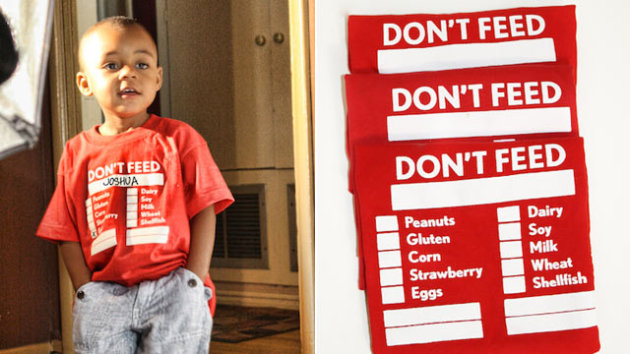Don't Feed Me' T-Shirts Calm Parents of Allergic Kids - Kym Whitley, a comedian and reality television show star, is launching a new line of "Don't Feed Me" T-shirts that parents of allergic kids can use to alert caregivers and others who might feed their children.

'Don't Feed Me' T-Shirts Calm Parents of Allergic Kids (ABC News)
17 Scary Allergy Triggers
Parents can use a pen to fill in the child's name and check off boxes of what the child is allergic to. Whitley first made the shirts for her son, Joshua, 2, who wore them to day care.
"The other parents were like, 'Oh my God that's great, we need that," said Whitley, whose new reality show, "Raising Whitley," starts April 20 on the Oprah Winfrey Network. It chronicles the Los Angeles single mother's experience raising her adopted son.
Now she's producing big batches of the T-shirts in different colors and selling them for $10 on her website, DontFeedMe.org, with co-creator Rodney Van Johnson, her friend, she told ABCNews.com. She's also selling clear bags that have the same "Don't Feed Me" warning on the sides that can hold Benadryl, Epi-Pens (epinephrine injectors) and other allergy aids.
At least 3 million American children have a food or digestive allergy, and the problem is growing, according to the U.S. Centers for Disease Control and Prevention. Between 1997 and 2007, the figure rose 18 percent.
Food allergies in children are age-dependent, said Dr. Wayne Shreffler, director of the Food Allergy Center at Massachusetts General Hospital in Boston. Small children have mostly egg, milk and peanut allergies, while older children might react to peanuts, shellfish and tree nuts, he said.
Death from food allergies are rare, and usually happen when an older child worried about social acceptance accepts food from a peer, Shreffler said. On average, a child with food allergies experiences a reaction once or twice a year.
Shreffler said he has "mixed feelings" about the T-shirts, because they could become a bully magnet.
"I think schools increasingly are aware of the issue," he told ABCNews.com. "By and large, most schools handle it well." Whitley said the shirts were meant to be worn by children who are too young - younger than 5 - to communicate their needs or to know how to read.
Shreffler said the T-the shirts might be useful for an introverted child in a specific setting, such as day camp, that relies on volunteers, he said.
Whitley said it was a nanny who accidentally fed her son peanut butter.
"Luckily, I was home," she said. "That's the thing. I heard that cough that sounded like what he had before he was tested."
Whitley had Joshua tested before he turned 1. A friend encouraged the testing, after hearing that Joshua had thrown up after eating eggs, had dry patches on his arm and would sometimes break out in red spots on his face, Whitley said.
When the test results came back, "the doctor told me to sit down and [she] said, 'Do you have a pencil and paper?' 'I said, 'What?' 'She said, yeah, it's a lot,'" Whitley said.
Joshua's most severe allergies included peanuts, chicken, corn, shellfish and peaches.
Whitley's friend, Van Johnson, who stepped up to become Joshua's father after Whitley adopted him as a baby, had the "Don't Feed Me" shirts made, Whitley said. Van Johnson was no stranger to food allergies: He learned that he shouldn't eat mango pits on a trip to Thailand as an adult.
Now Joshua wears his "Don't Feed Me" T-shirt when he's with a new babysitter or goes to a kids' party, for example, his mother said.
The shirt also makes it easy for teachers and habitual caregivers to remember what Joshua can't eat, she said. With the shirt making it obvious, adults around Joshua don't have to fish for a piece of paper in his backpack, look for a note pinned onto his shirt or go through a classroom file.
"It's right there," she said. ( ABC News )
No comments:
Post a Comment